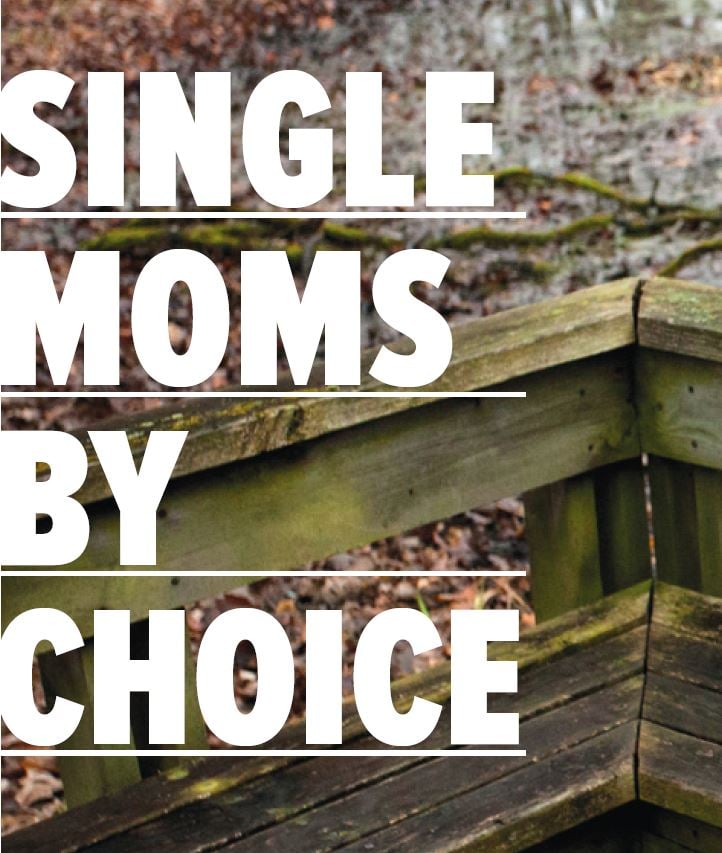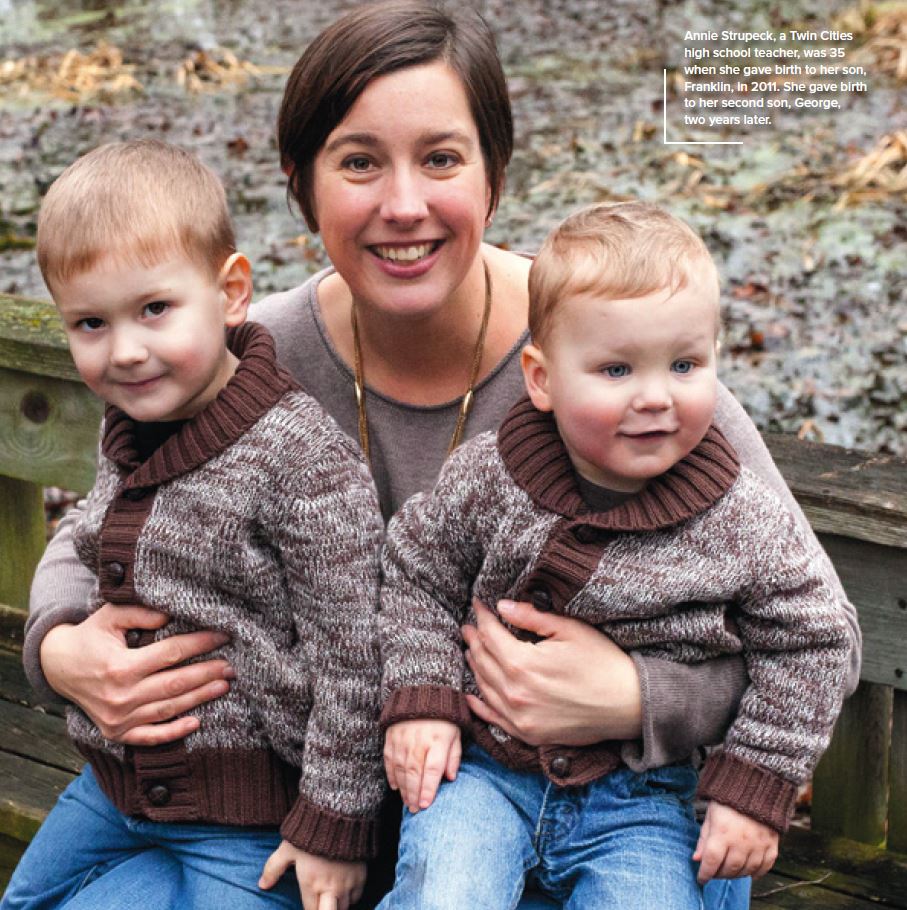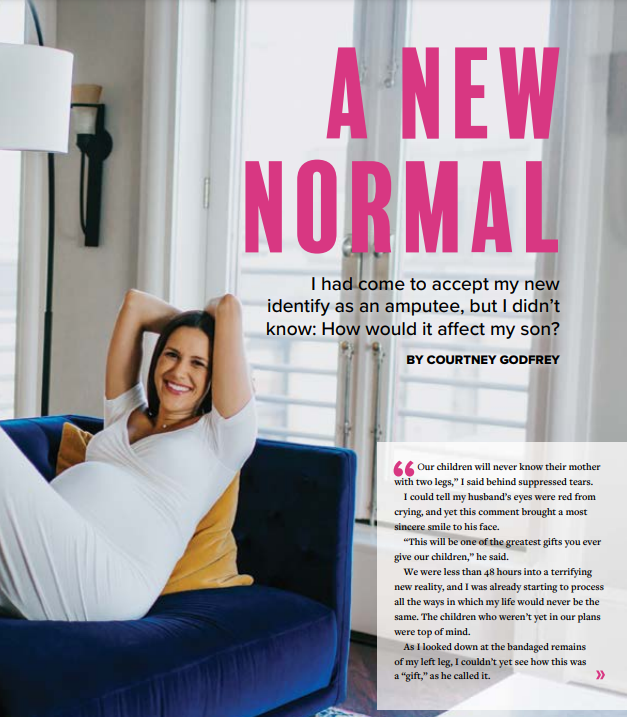These five local women didn’t wait for marriage to start their families. And they’re finding a world of love they might otherwise never have experienced.
In American culture — and beyond — there’s an expectation that marriage comes before motherhood.
There’s also a stereotype that single mothers are the result of unwanted or unintended pregnancies or the product of absent fathers.
But a fast-growing group of women are shattering both long-held expectations and stereotypes by becoming SMCs — single mothers by choice.
These unmarried women, usually in their 30s and 40s, often undergo fertility treatments. Many use sperm donors to become pregnant. Others choose adoption or surrogacy.
In the Twin Cities, the rarely discussed movement has created a growing network of women with strong support groups — online and in person.
Their friends and families often help them choose suitable sperm donors by reading their online profiles or attending donor parties to pick the best match.
Single parenthood might not have been their first choice. But life without a child to call their own? Unthinkable. Here are some of their stories.
YEARNING FOR MOTHERHOOD
Becca Starr always knew she would one day become a mom.
The Twin Cities native loved children. Starr even had professional expertise in early childhood education, thanks to her work as a researcher at the Midwest office of Maryland-based Child Trends, a national nonprofit nonpartisan center that studies children at all stages of development.
But at 39, after achieving most everything she had set out to do — including earning her Ph.D. in child psychology and traveling the globe — something remained missing.
“The one thing I really wanted to do was to be a mom, but I kept getting older and older, and I never thought I could do it,” Starr said.
A turning point came during Christmas as she read a children’s story to her 5-year-old niece, who pointed out that Starr didn’t have her own family in her house.
“It’s just you,” her niece said.
“It really hit home,” Starr said. “After that, I woke up one morning and felt I had to do something.”
Starr had ordered a few books on single mothers by choice a couple years earlier, but had never opened them. She pulled them out and started reading.
“I am educated. I have family and friends. I can do this,” Starr told herself at the time. “For me, it was like a light bulb went on. I just had to make it happen.”
A long road to … twins!
It didn’t happen quickly.
Two years and two months after Starr’s first doctor’s appointment, she finally learned she was pregnant — with twins.
In between, she had unsuccessfully tried a few unmedicated intrauterine insemination cycles (IUI), four medicated IUI cycles and two rounds of in vitro fertilization (IVF) — at $17,000 a pop.
Next she had surgery for fibroids, and then another round of IVF.
She finallhy became pregnant in March.
On Nov. 13, Starr gave birth to her sons, Jacob and Will. She was 42.
For the first three months of their lives, Starr left the house only to take her twins to the doctor.
She slept in 45-minute intervals. Each day was all about survival. She moved in with her parents, who lived 10 minutes away, for seven months.
Friends and family would help out by bringing meals, running errands or watching babies while she slept.
“The first six months, I can’t even explain them,” Starr said with a laugh. “It was insane. I like to say I was hibernating, but without sleep. But then, it gets easier — and then there are new challenges.”
Her life is completely different now.
“It’s nonstop, much harder and physically demanding,” she said. “But I’m so much more content. I’m just so much happier and I love being with my boys.”
Starr wishes she were 10 years younger.
“When I wake up, my back hurts and I have to pick up two 20-pound boys,” she said. “But it’s all good.”
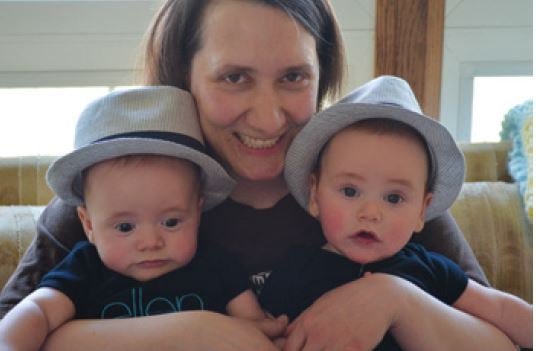
STARTING EARLY, HAPPILY
Alicia Allen, an assistant professor at the University of Minnesota, embarked on a two-week yoga retreat to Belize in January to clear her mind so she could decide whether she should try to become pregnant on her own.
Her trip affirmed her belief that she was on the right path.
She researched prospective donors, and created a private Facebook page so her close friends and family could discuss and debate her donor candidates.
At 33, Allen was younger than most single moms by choice (SMCs), but she couldn’t see the point of waiting any longer.
“For me, I knew this feeling wasn’t going to change,” Allen said. “I have a lot I can give to a child and that wasn’t going to change, so why not go after the dream?”
Allen joined the Twin Cities SMC Facebook group. Reading about other moms’ experiences gave her an insider’s view on issues affecting those who were thinking, trying and mothering. She also talked over her decision with family, friends and coworkers, who were supportive.
She got pregnant on her second round of IUI. The successful donor was 6-foot-5, educated and into sports and music. He seemed like someone she would want to date.
After two days in labor, Allen gave birth in January via C-section to her son, Lochlan.
Allen has no regrets: “Each day I fall deeper and deeper in love with him,” she said. “He is, by far, the best decision I’ve ever made.”
FEAR OF A FATHERLESS PATH
Mary Jaros was 36 when she walked across the street from her job at Abbott Northwestern Hospital to the Center for Reproductive Medicine in Minneapolis to start the fertility process. Her coworkers helped her choose her donor.
“I saw a photo of the donor as a young boy. He was probably 3 or 4 years old and had the sweetest smile,” Jaros said.
The donor was an open-identity anonymous donor, which means he’s willing to be contacted when his offspring reach adulthood. That was an added bonus for Jaros.
Jaros’ fourth IUI attempt was a success. (Her daughter is nearly 7 now.)
Her decision to use a donor wasn’t an easy one.
“I felt a little guilty. I wondered if I was being selfish and depriving her of a father,” Jaros said. “But I also felt — in this day and age — phenomenal kids come from single moms and from married moms, and people will always have an opinion one way or the other, and I had to toughen up against it.”
Jaros and her husband — yes, she’s technically no longer an SMC — met through a mutual friend when her daughter was 4. They married 1 1/2 years later. They had a second child in March, a son conceived using her husband’s sperm and a donor egg because her eggs “were not up to par.”
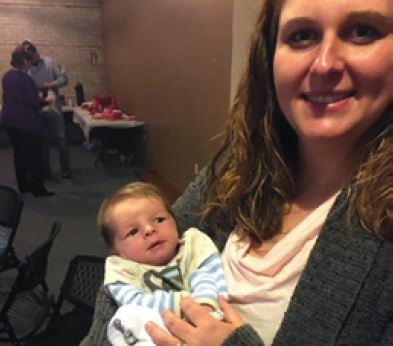
›SIBLINGS, SICKNESS, SURPRISES
It can take a village to raise a child, and sometimes it takes a village to conceive one, too.
Annie Strupeck, a Twin Cities high school teacher, was in the “thinking” stage of becoming a single mother when she discovered the Minnesota Single Mothers by Choice group online.
She went to an SMC conference and connected with a few other “thinkers.” It took time for her to process the concept of becoming pregnant alone.
Strupeck was 35 when she gave birth to her son, Franklin, in 2011. She knew she wanted to give Franklin a sibling, and she had purchased an extra vial of the donor’s sperm to help her when the time was right.
Unfortunately, she didn’t become pregnant and there were no longer any vials left.
She could have sought out other families who had used the same donor to see if they’d sell a vial or two to her, but ultimately, she decided to choose another open-ID anonymous donor with similar characteristics.
She gave birth to her second son, George, two years later.
“Being outnumbered has definitely been challenging, but I don’t regret having two at all,” Strupeck said, of her boys, now ages 4 and 2.
When she’s sick and the kids are sick, too, it’s tough.
“You are the only caretaker all the time,” she said. “You’re 100 percent responsible for these kids all the time and it can feel overwhelming sometimes. Having a great support network is really important.”
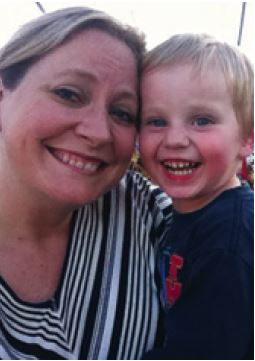
Strupeck doesn’t have immediate family living nearby. Her mom lives in Chicago. Locally, she has extended family and friends who help out a lot.
Strupeck was surprised to discover she already knew other SMCs working in her boys’ school district and living in their neighborhood.
“I think it’s much more common than some people might think,” she said. “I go through different phases of different worries about having a nontraditional family, but if you normalize it from the very beginning, and have open communication with your children, the worries and concerns go away. I think being part of the SMC group and meeting other families like ours is important, too, so my kids know we’re not alone in this family structure, that there are a lot of families like us.”
Single mom by choice Suzanne Monical of Pequot Lakes adores her 3-year-old son, Remy. She’s found support and even donor siblings — who share the same birth father as her son — through other local and national SMCs.
DONOR SIBLING GROUPS
Suzanne Monical moved last year from Maple Grove to her hometown of Pequot Lakes, near Brainerd, to be closer to family after she had her son, Remy, 3.
She worries that in a small town he could be treated differently because he doesn’t have a father. However, at her first doctor’s visit up north, she learned from her son’s new pediatrician that his patients include children of other SMCs.
Monical remains connected to the Twin Cities SMC group, which she became involved with when she was thinking about becoming pregnant.
Not long after her son was born, Monical found several of her son’s donor siblings — there are now at least 18 families with 20 donor siblings and three more on the way — and the families have had two reunions so far.
Many live in the Twin Cities, but they’re also spread throughout the U.S.
She belongs to a private Facebook page where they share photos and updates on their children, who all seem to share the same, distinctive forehead.
“I really appreciate the donor-sibling group,” Monical said. “I didn’t go into this searching for donor siblings, but when one of my SMC friends and I discovered we have donor siblings and we connected with the larger group, I realized how positive that’s been, especially since I only have one child. They’re part of our extended family.”
RESEARCH IS LIMITED
There are few studies on the outcomes of children of SMCs. Starr has proposed a research study on SMCs and is working to find funding for the study.
“It’s an entirely different demographic,” she said. “There definitely has to be more research on how this group is different and how the outcomes might be different.”
Starr’s advice for women thinking about becoming SMCs is to start early. Do the research, talk to other SMCs. Don’t stall because the prospect of doing it alone seems scary.
“You can so do this by yourself,” Starr said. “The reason you think you can’t is because society has put constraints on you. Don’t be afraid of what other people are going to think. People are most likely going to be more supportive than you expect. There are so many people who love my children. It’s an incredible experience.”
RESOURCES
SITES
•Single Mothers by Choice: Contact the national organization at singlemothersbychoice.org to be referred to the Minnesota SMC group and its private Facebook group.
•Choice Mom: Started by Minneapolis journalist Mikki Morrisette, a Choice Mom herself, this site (choicemoms.org) offers resources, connections, and support for SMCs.
BOOKS
• Single Mothers by Choice: A Guidebook for Single Women Who Are Considering or Have Chosen Motherhood by Jane Mattes
• Choosing Single Motherhood: The Thinking Woman’s Guide by Mikki Morrissette
• Single by Chance, Mothers by Choice: How Women Are Choosing Parenthood Without Marriage and Creating the New American Family by Rosanna Hertz
• Knock Yourself Up: No Man? No Problem: A Tell-All Guide to Becoming a Single Mom by Louise Sloan
• The Family Book by Todd Parr is geared toward preschoolers to second-graders and celebrates family diversity.
Jodie Tweed is a freelance writer who lives in Pequot Lakes.





